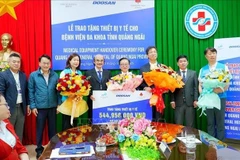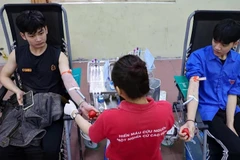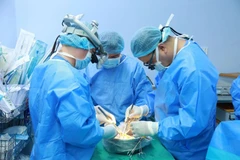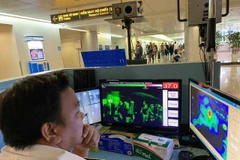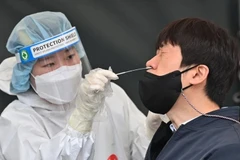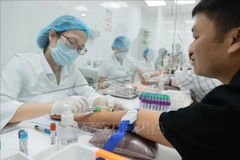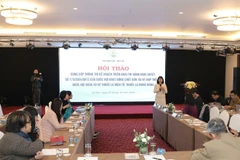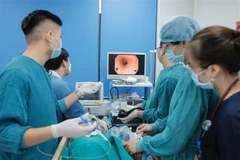 The health sector is enhancing the application of information technology (IT) in remote examination and treatment (Photo: VietnamPlus)
The health sector is enhancing the application of information technology (IT) in remote examination and treatment (Photo: VietnamPlus)
Hanoi (VNA) – The strong growth of information technology has promoted the development of all fields, including health care.
Experts have noted that digitalisation will become an inevitable trend, being a firm launching platform for a smart health sector.
As COVID-19 broke out across the globe, the health systems of even the most developed countries fell into crisis. In just nearly three weeks of March, hospitals in the northern part of Italy became overloaded, posing major a challenge to containing the spread of the disease. The situation was the same in the US.
The rapid increase of COVID-19 patients in a short time triggered a severe shortage of medical staff and equipment. Therefore, the change of traditional methods in management of patients has become more important than ever.
Overloading in hospitals, oversized population and recently-discovered diseases, among others, have put the global health sector under new pressure. On the other hand, the ongoing pandemic has been a spanner in the constant update on new knowledge of health workers. While new technologies is introduced day by day, training programmes are forced to be put on hold due to travel restrictions, putting health workers at the risk of lagging behind compared to the sector’s development.
In Vietnam, in addition to fighting COVID-19, the health sector is facing huge pressure on meeting the increasing demand.
A 2018 report of Business Monitor International showed that annual health care cost in Vietnam is projected to rise to 400 USD per person by 2027 from 170 USD reported ten years earlier. With such growth rate, the country’s health sector needs to at least double its equipment and staff in the upcoming 10 years.
CEO of GE Vietnam Pham Hong Son pointed out that fluctuation like COVID-19 acts as a factor speeding up digital transformation in the health sector.
The pandemic has brought about an abrupt surge in medical demand so it is difficult to meet the demand in a traditional way. It has helped promote the application of technology in the health sector which had had numerous bottlenecks before. Technology has proved efficiency and role on this occasion.
Son noted that with the ability to improve both quality and speed of medical services, digital technologies are forecast to become helpful tools in the health sector, aiding hospitals and health workers to surmount challenges of not only the current pandemic but also similar situations in the future.
The most obvious benefit of the digital technology is to improve effectiveness of diagnosis, thus minimising human errors, increasing accuracy and facilitating patient management. For instance, a portable X-ray device integrated with artificial intelligence (AI) is able to detect pleural effusion. Such device has been used in leading hospitals in Vietnam with an accuracy rate of 95 percent, saving costs while ensuring safety for patients.
Furthermore, AI can be applied in the management of activities at diagnostic imaging departments, reducing time of checkups by about 16 percent for patients.
At present, with modern technology, doctors can keep a close watch on patient’s conditions without direct visits in all situations, regardless of disease or natural disaster. This helps to mitigate infection risks of communicable diseases as well as provide chances to access high quality medical services for people in remote and mountainous regions.
In Vietnam, many technologies have been utilised to improve medical service access and proved effectiveness, especially during pandemic time, such as a remote medical centre (Tele-ICU).
Digital technology also helps to address challenge on human resources. Data from Solidance illustrated that Vietnam has around 8.6 doctors among 10,000 people. However, most of health workers reside in the two major cities of Hanoi and Ho Chi Minh City. Therefore, online training programme are a solution to balance of skills among levels./.









